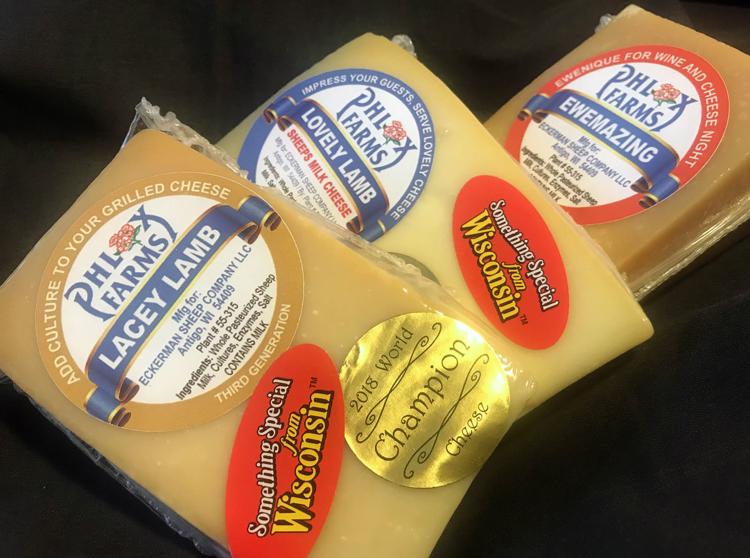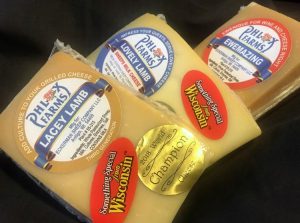
Eckermans Raising Awareness of Sheep Cheese
Esquirrou, a sheep’s milk cheese from France, captured the grand prize at the last World Championship Cheese Contest.
Still, awareness of sheep’s milk cheese, especially here in the Midwest, pales in comparison to cow’s milk cheese or even goat’s milk cheese.
And that’s something Darlene Eckerman hopes to change.
“So many people don’t even know there’s such a thing as sheep cheese,” she said. “They know about cheese from cows and some people may know about cheese from goats. But sheep cheese, they just don’t know about it at all. They’re missing out on a great cheese.”
Darlene and Steve Eckerman own Eckerman Sheep Co., with the sheep’s milk gathered on the rural Langlade County farm marketed under the Phlox Farms cheese label. Their hard sheep’s cheese is made by Katie Fuhrmann of LaClare Family Creamery.
Eckerman Sheep Company and Phlox Farms recently received one of 10 Dairy Processor Grants administered through the Wisconsin Department of Agriculture, Trade and Consumer Protection. The grants are designed to facilitate operational changes, improve profitability and foster innovation and economic growth.
Regarding their $11,931 grant, Darlene said, “It’s very difficult to get an in-road into markets. We don’t have enough to go with a distributor, and we have too much to just sell it out of our front door. So the grant is for promotion and getting point-of-purchase material.”
The Eckermans sell some of their sheep cheese at the farm, N681 S. Rollwood Road, west of Phlox and south of Antigo, from 9 a.m. to 5 p.m. Mondays through Thursdays.
In addition, West Allis Cheese and Sausage Shoppe locations in West Allis and Milwaukee “have done a phenomenal job helping promote our product,” Darlene said. Phlox Farms is scheduled to attend the business’ third annual Curds and Kegs event from 6:30 to 9 p.m. on May 22 at the West Allis Farmers Market, 6501 W. National Ave., West Allis.
Phlox Farms’ roots date back more than 100 years.
Darlene said her grandfather, Alfred F. Schulz, attended the Short Course at UW-Madison and then, in the early 1910s, bought a butter plant in Phlox, where he made butter and cheese with cows’ milk acquired from area dairy farms. The operation branched out into producing ice cream and milk.
Schulz’s son, Alfred, eventually took ownership of A.F. Schulz Creamery, and Darlene and Steve ended up working there too. The business closed in 1985.
“I remember having to go into that extremely cold cooler and wrapping butter as a child,” Darlene said.
Steve and Darlene left the area and moved back in 1989. They engaged in 4-H activities, “and from there my husband decided to get into milking sheep, so we raised those for a number of years,” she said.
When the flock got big enough, they milked for a Wisconsin dairy sheep cooperative.
“And sheep’s milk, unlike cows’ milk or goats’ milk, can be frozen,” Darlene said. “We’d milk the sheep and freeze it in bags and it would go on pallets to upstate New York to Old Chatham Co-op.”
In 2005, the Eckermans accepted “a strong offer” on the flock, but the buyers didn’t take the lambs, she said. When the lambs got big enough the next year, the Eckermans milked again and made cheese out of that milk.
“That’s how we got back into the cheese business,” said Darlene, noting they started milking in 2007 after building a parlor.
Steve works with flavors and cultures at his full-time job, so Darlene said, “We are able to come up with the perfect recipe for the cheesemaker.”
“Sheep’s milk is richer with higher butterfat and a little sweet,” Darlene said, “so the cheese that it makes is smooth, rich, creamy and just phenomenal, awesome. I don’t have enough words that I can describe it with.”
Darlene prefers eating sheep’s milk cheese by itself, although she added it goes well with many foods in addition to both red and white wine.
“It’s not the type of cheese where you sit down and eat a pound or cook tons of food with it,” she said. “But it’s a wonderful hors d’oeuvre, a snacking type of cheese. Something you would have at parties or with wine.”
Darlene said they usually get 12 pounds of sheep cheese per 100 pounds of milk, “so the yield is better than with cows’ milk.”
Phlox Farms entries have fared well in cheese competitions. At the last World Championship Cheese Contest, in 2018, Phlox Farms earned Best in Class honors in the category for hard sheep’s milk cheese (9 months or longer), beating 24 competitors from Spain, Croatia, and other states.
For more information, visit www.eckermancheesecompany.com.
Source: The Country Today

